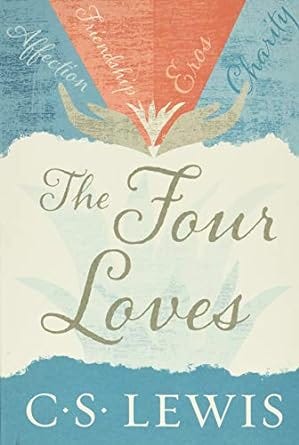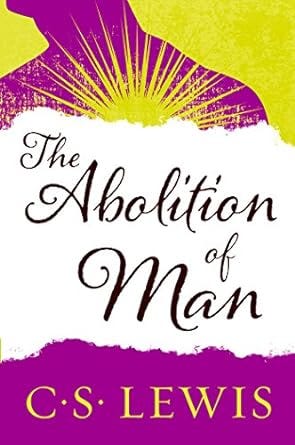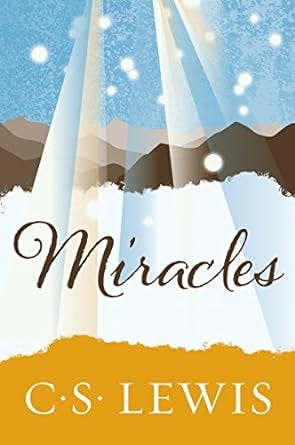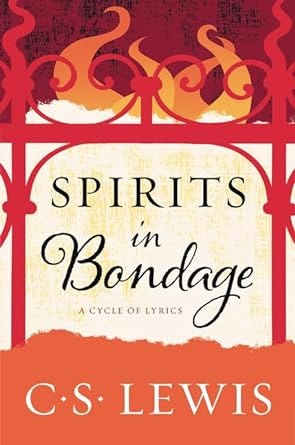
I did not read every one of Lewis’ works, but I read all twenty-seven of his major works. What a journey. What a privilege. It is rare to read all of an author’s canon and to be able to say, “I know the works of Lewis. I personally read them all.”
I labored on this list. Of course, it is subjective, but I gave my reasons for my ranking. I hope this encourages you to pick up C.S. Lewis again.
#24: The Four Loves

Ranking: 15.1 (out of 5)
Theological content 2.5
Readability 3.5
Character development N/A
Originality 3.0
Cultural influence 2.8
Personal Engagement 3.3
Summary
In this work, Lewis attempts to dissect the four loves: affection, romantic, agape and friendship. He dedicates a chapter to unpacking and flushing out each of these loves. He elevates love, in all of its forms, but his presentation is manic, the opposite of systematic, which I think is what he was attempting.
Does Lewis try to exegete God’s revelation regarding love? Yes. Weakly. Sort of. Are there gems within this work? Yes. There always is with Lewis. He tries to blend sociology, anthropology and theology. But I don’t think it ever really works.
Favorite quotes
“We may give our human loves the unconditional allegiance which we owe only to God. Then they become gods: then they become demons. Then they will destroy us, and also destroy themselves.” (p.14)
“Love, having become a god, becomes a demon.” (p. 25)
“Without Eros none of us would have been begotten and without Affection none of us would have been reared; but we can live and breed without Friendship.” (p.91)
“It has no survival value; rather it is one of those things which give value to survival.” (p.98)
“It is the sort of love one can imagine between angels.” (p. 107)
Personal musings
By far, my favorite chapter of the book was the chapter on friendship. I don’t think it is a stretch to say that if Lewis had not met Joy Davidson, his male friendships would have been sufficient in his life. Lewis boldly asserts that friendship love is the love of angels (which is a fascinating thought), that friendship love is the least jealous of all loves and that friendship love is anti-authoritarian. In other words, controlling the masses is more difficult if friendship love exists. Bottom line, there are some great gems in this work, but it is wanting as a theological work and it lacks depth for a significant sociological work. I wish Lewis would have just picked a path.
#25: The Abolition of Man

Ranking: 15.0 (out of 5)
Theological content 2.5
Readability 3.5
Character development N/A
Originality 3.0
Cultural influence 3.0
Personal Engagement 3.0
Summary
The ideologies of Lewis’ day: subjectivity and relativism. This book by Lewis is a response to the fictional The Green Book, written by fictional characters, Gaius and Titius, who espoused these ideologies. This work is short and direct. Lewis calls natural law or traditional morality, the Tao, in this work. Basically, living without The Tao is untenable or “men without chests”, as Lewis calls them. What is the goal? The abolition of man. Removing anything objective so they can be conditioned and rebuilt, likely through the means of eugenics.
Favorite quotes
“We make men without chests and expect of them virtue and enterprise. We laugh at honour and are shocked to find traitors in our midst.” (p.29)
“It is the magician’s bargain: give up our soul, get power in return. But once our souls, that is, our selves, have been given up, the power thus conferred will not belong to us. We shall in fact be the slaves and puppets of that to which we have given our souls.” (p. 67)
Personal musings
I read this book three times. I still am left unimpressed. I know Lewis’ point and he tries to do this without espousing Theism, but I wish he would have just planted the flag. I get the incongruency of subjectivity, compared to the real world. I get what Lewis was trying to accomplish by elevating instinct, but even instinct is not uniform to everyone. We must embrace a set of values outside of us, outside of our feelings, outside of us. Again, he is not wrong, but I found myself longing for more. I am truly glad this was one of Lewis’ shorter works. Oh — and it is a coin flip to me if this was better or worse than Miracles.
#26: Miracles

Ranking: 15.0 (out of 5)
Theological content 3.5
Readability 3.0
Character development N/A
Originality 3.0
Cultural influence 2.5
Personal Engagement 3.0
Summary
Miracles is a book where Lewis attempts to debunk and address the naturalist who claims that this world cannot be explained without God. Lewis spends most of the book pointing out that the naturalist cannot logically do it, in his typical winsome way. Lewis touches briefly on other disciplines such as epistemology, eschatology, anthropology and other ologies along the way. He always clarifies that he is not a theologian, nor an expert in most fields of study. Chapter eleven is fascinating, Lewis gives his assessment of the appeal of pantheism to broad humanity. I am not sure I agree completely, but any ride in which Lewis is the conductor is always worth the price. The basic point of the book is that supernaturalism is the only answer to all of reality.
Favorite quotes
“We shall still be able to recognise our old enemy, friend, playfellow and foster-mother, so perfected as to be not less, but more, herself. And that will be a merry meeting.” (p. 111)
“The accounts of the ‘miracles’ in first-century Palestine are either lies, or legends, or history. And if all, or the most important, of them are lies or legends then the claim which Christianity has been making for the last two thousand years is simply false.” (p. 116)
“In the Christian story God descends to re-ascend. He comes down; down from the heights of absolute being into time and space, down into humanity; down further still, if embryologists are right, to recapitulate in the womb ancient and pre-human phases of life; down to the very roots and sea-bed of the Nature He had created. But He goes down to come up again and bring the whole ruined world up with Him.” (p. 163)
“The ultimate spiritual reality is not vaguer, more inert, more transparent than the images, but more positive, more dynamic, more opaque.” (p. 153)
Personal musings
I will say this again and again. I now understand why people say C.S. Lewis is not a systematic theologian. He is not a systematic theologian. Furthermore, I had to work way too hard to find the typical literary or theological nuggets that forces me to appreciate Lewis. I mean — they are there, but it is like an Easter egg hunt that is way too hard and then you find out there is no candy in the eggs. I hate to say this — but this book did not need to be written. Probably writing the first three chapters would have been sufficient. Naturalism is not enough. It does not provide these necessary answers. Supernaturalism does. Sure, it takes a leap of faith but not as much as naturalism does. This is why I have Miracles towards the bottom of Lewis’ canon.
#27: Spirits in Bondage: A Cycle of Lyrics

Ranking: 14.0 (out of 5)
Theological content 2.5
Readability 3.5
Character development N/A
Originality 4.0
Cultural influence 2.0
Personal Engagement 2.0
Summary
Lewis wrote a number of poems. This is one of his earliest works, some would say he was not a Christian when he wrote this. There was an occasional religious focus, but mostly it was either the acknowledgement of a deity or criticism of this supposed God. Fairies were written about throughout, tipping his cap to the influence of George MacDonald, who he later on stated influenced him tremendously.
Favorite quotes
“The veil of endless beauty be,
Filled full of spirits that have trod.
Far hence along the heavenly sod,
And see the bright footprints of God.”
(XXVI — Song)
“Ah, to be ever alone,
In flowery valleys among the mountains and silent wastes untrod,
In the dewy unland places, in the garden of God,
This would atone!”
(XL — Death in Battle)
“The fierce, cold eyes of Godhead gleam,
Revolving hate and misery.”
(XXII — Hesitation)
Personal musings
I have to admit — I am not a big fan of poetry. Lewis here seems raw and scattered. There is a primitive angst within him, bleeding through the instrument of poetry, but it is not compelling. He seems like a hormonal adolescent, expressing random thoughts through an unchecked medium. It did not hold my attention and therefore, was without debate the least favorite of Lewis’ works to me.
